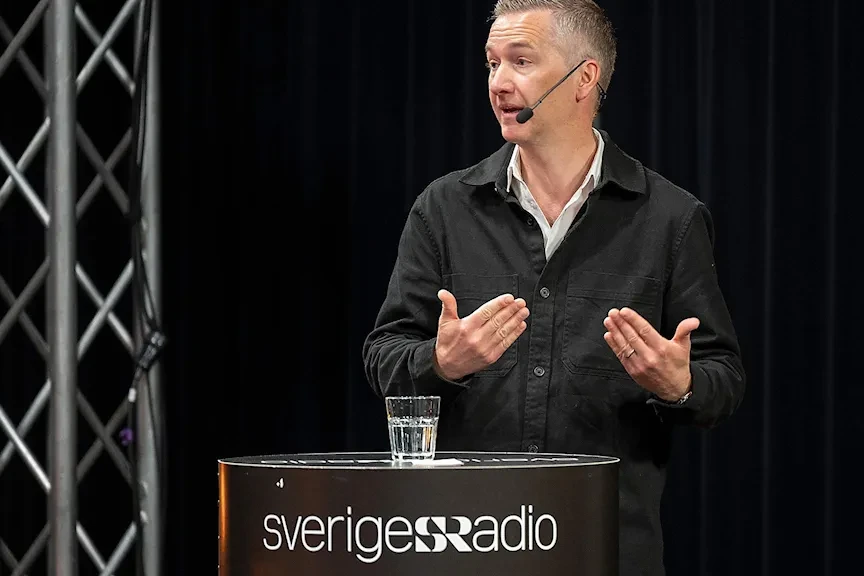Swedish Radio to save 200-250m SEK
18th September 2023
Due to high inflation, Swedish Radio has announced an important savings plan, which will involve job losses and content reforms.

– By Charlotte Pion
IN BRIEF:
- Swedish Radio’s CEO Cilla Benkö has announced a significant savings plan of up to 250 million SEK due to high inflation.
- The Culture Minister has rejected calls for providing additional funding to the public service broadcaster.
- Impact is expected on staff and programmes.
- The public television broadcaster, SVT, has warned it could also be looking at a savings package.
IN FULL:
Swedish Radio (SR) is to undergo an extensive financial saving programme, due to rising costs across many aspects of the business.
The CEO, Cilla Benkö, delivered in a statement the different reasons why the public media had to take these measures, as well as the vision they will follow in the future.
Alongside the ongoing investigation into Swedish public media, the recent announcement by Ms. Benkö on important budget cuts to save up to 250 million SEK (€25 million) raises important questions over the future of Swedish public media. The public television station, SVT, has also intimated they are also forecasting cuts.
Meanwhile, the Culture Minister has reportedly rejected calls for additional funding for civil defence.
Why are Swedish Radio having to make cuts?
The current economic situation in Sweden, which has recently seen the highest peak of inflation in the last 30 years, impacts the entire society. Recent figures for August showed headline inflation was at 4.7%, down from 6.4% in July.
Public media are not exempt from the economic situation. Amongst the financial challenges they have to face, Cilla Benkö mentioned the rise of rent prices and salary increases. Rents alone have increased by 10%, she said.
“Taken together, these challenges mean that we must act and make extensive savings even though we currently have a balanced economy,” she said.
Swedish Radio’s revenue only increases by 2% every year. “Inflation erodes the grants quickly, which means that the costs increase faster than the grants are added up.”
Economic pressures are not the only reason why SR has reviewed their budget. The broadcaster also has to make important investments, notably in new informatic and radio equipment so the broadcaster does not become obsolete.
Furthermore, there have been recent changes in security policies, which meant SR now has to invest more in security protection and preparedness, as public media plays a decisive role in civil awareness in times of emergency.
“I think we will have a reduced range, fewer programs and a tougher working environment for those who remain.” – Chair of the Trade Union at Swedish Radio, Johanna Lindblad Ahl.
Consequentially, Swedish Radio is now planning to reduce costs throughout the entire company and choose its priorities for the future of its services. However, Ms. Benkö promised such changes would be aligned with the broadcaster’s broader vision – namely providing stronger stories with more voices to represent society and undergoing technical development to become a robust digital media organisation.
However, among the various strategies, it was announced that some of SR’s employees would be laid off. The broadcaster is currently unable to clarify how many people it concerns or when this rule is going to apply.
Subscribe toour newsletter
Keep updated with the latest public
media news from around the world
SR not the only one experiencing difficulties
When questioned by the newspaper Aftonbladet, SVT’s programming director, Andreas Bedinger, explained that the current situation of pressure in the media industry has led to a reconsideration of certain programs. In a statement he gave to the newspaper, he mentioned the necessity to put on hold or cancel certain shows as the ongoing economic situation required drastic savings.
In an echo of what Ms. Benkö announced, Mr. Bedinger highlighted the issues of higher production costs and that, therefore, choices had to be made in order to be able to provide good public services to their audience.
Read more: Swedish Radio has to save money
This announcement of big budget reforms on the eve of a new management remit inscribes itself in a larger context of different public service media across Europe who are also engaging in large economic savings to face current challenges of an ever changing media landscape.
“A tougher working environment for those who remain”
Reacting to the announcement, the Chair of the trade union at SR, Johanna Lindblad Ahl, told SVT that although they were aware of the “tough financial situation”, she was not prepared for “such large savings.”
“I think we will have a reduced range, fewer programs and a tougher working environment for those who remain.”
The public broadcaster had written to the responsible ministers in both the current and previous governments to request more money for civil defence duties. The current Culture Minister, Parisa Liljestrand, did not confirm to Swedish Radio whether this would be achievable, although one newspaper, ETC, has reported she denied the request.
Importantly, these budget cuts have occurred during an ongoing investigation led by the government into public media that aims at establishing the long-term conditions for a stable and independent public service for its next licence period (2025-2033). The directives of the investigation, published a few months ago, suggested the mission of public media will be re-clarified and an assessment on its presence on the Swedish media market.
This investigation is part of the regular parliamentary process, to ensure a fitting remit for public media.
However, the directives have faced criticism from opposition politicians for not focusing enough on the strengthening of public media’s independence, while Swedish Television’s CEO, Hanna Stjärne called for public media to be fully resourced.
Cilla Benkö also pointed out earlier this year how careful politicians involved in the investigation should be, as they hold responsibility to Swedish democracy by handling the independence of public service media.
Related Posts
21st March 2023
Sweden: Public service investigation directives unveiled
The investigation will focus on…
29th September 2022
Sweden: Implications for public media after election
Elections in Sweden have seen gains for…


